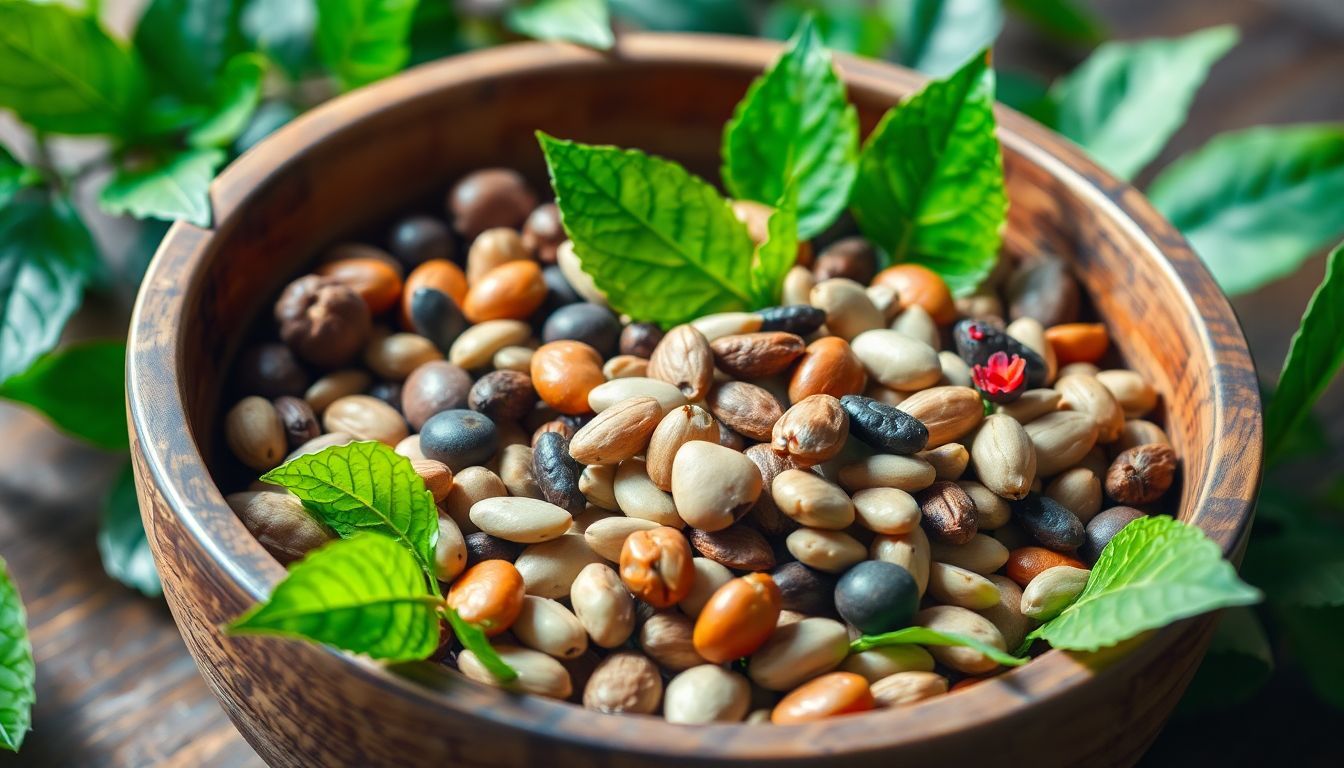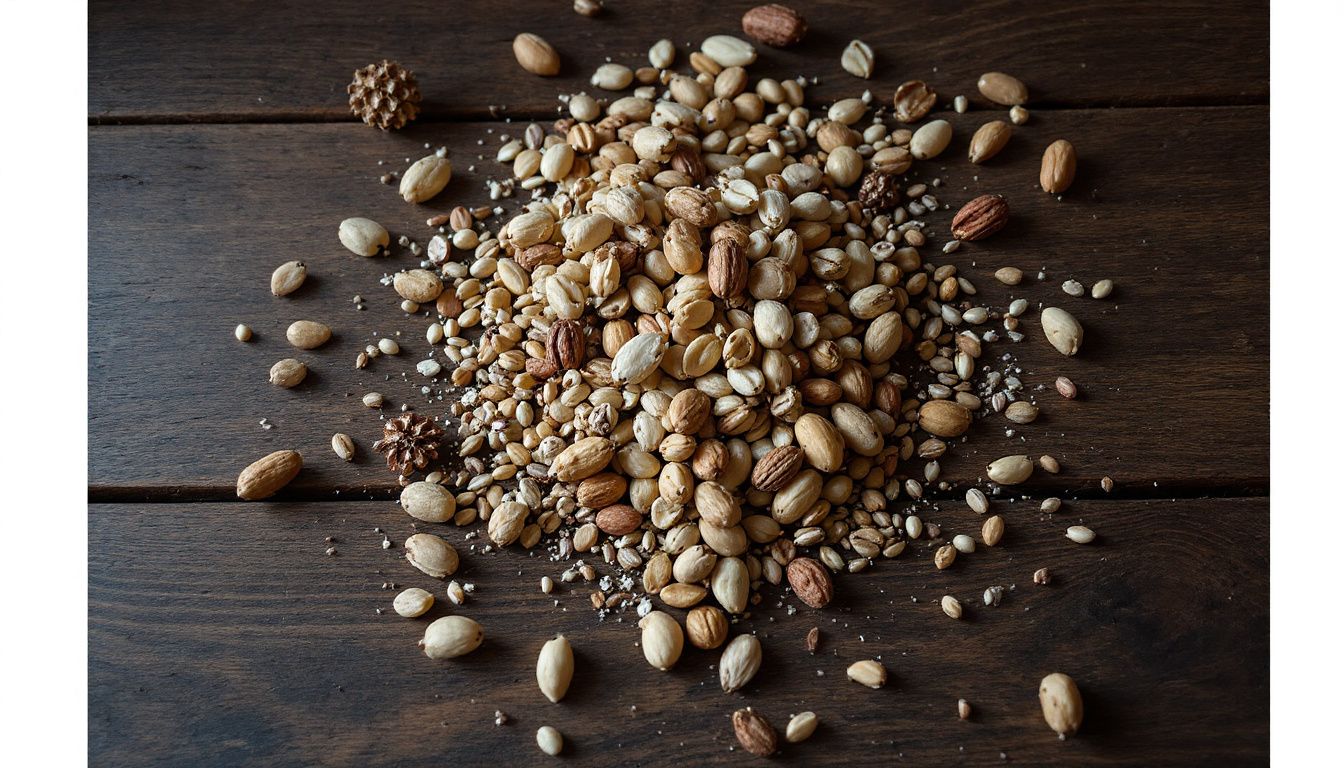Do you want to eat healthier but don’t know where to start? Nuts and seeds are packed with protein, healthy fats, and vitamins that boost your health. This guide will show you their benefits, the best options to pick, and quick ways to add them to your diet.
Thank you for reading this post, don't forget to subscribe!Start today—your body will thank you!
Key Takeaways
- Nuts and seeds are rich in protein, healthy fats, fiber, and vitamins. Almonds provide half your daily vitamin E needs per ounce. Chia seeds offer 4,915 mg of omega-3 fatty acids per serving.
- Walnuts lower bad cholesterol (LDL) while improving good cholesterol (HDL). Pumpkin seeds help manage insulin levels for type 2 diabetes patients. Both promote heart health.
- Choose raw or lightly roasted nuts/seeds to preserve nutrients like omega-3s and vitamin E. Avoid added sugars or excess sodium to maximize health benefits.
- Portion control is key—1 ounce is enough for most people due to high calorie density. Limit salted options if monitoring blood pressure or overall heart health.
- Add nuts/seeds to smoothies, salads, baked goods, or yogurt for extra crunch and nutrients like zinc, calcium, and fiber without much effort!
Health Benefits of Nuts and Seeds

Nuts and seeds are packed with nutrients that support good health. They can help your body, from improving heart strength to keeping you full longer.
Heart health and cholesterol improvement
Walnuts help lower LDL cholesterol (“bad” cholesterol) and boost HDL cholesterol (“good” cholesterol). Better blood flow reduces the risk of heart disease. Almonds can also support heart health by improving circulation and lowering cardiovascular disease risks.
Pumpkin seeds bring benefits too! They help reduce LDL levels and manage insulin in type 2 diabetes. Nuts and seeds are rich in omega-3 fatty acids, monounsaturated fats, and polyunsaturated fats.
These healthy fats keep arteries clear and improve overall heart function.
Weight management and satiety
Nuts are packed with healthy fats, protein, and fiber. These nutrients help you feel full longer, reducing food intake. Almonds, for example, are great for improving satiety as snacks or meals.
Studies show regular nut consumption may aid in weight loss without causing weight gain.
Chewing nuts well affects how their fats release during digestion. This can impact energy levels and hunger control. High-protein foods like nuts also lower calorie density—making them a smart choice for a weight-loss diet focused on fat loss and maintaining fitness goals.
Rich source of protein, fiber, and healthy fats
These small powerhouses provide protein, fiber, and healthy fats in every bite. Almonds offer 14g of fat, 3.4g of fiber, and are packed with vitamin E—50% of your daily needs—in just one ounce.
Cashews contain 13g of fat and 1.9g of iron per serving to support energy levels.
Pumpkin seeds deliver a solid balance too—146 calories per ounce with 12g fat (only 2g saturated), plus zinc for a strong immune system. The monounsaturated and polyunsaturated fats help lower LDL cholesterol while promoting heart health.
They keep you full longer, making them great for weight management plans.
Healthy eating starts with simple steps… like adding nuts or seeds.
Best Nuts for Overall Health
Nuts are packed with healthy fats, protein, and vitamins that support overall wellness. They can boost heart health, lower bad cholesterol, and provide long-lasting energy.
Almonds, walnuts, and pistachios
Almonds pack 163 calories per ounce, with 14 grams of fat and 3.4 grams of fiber. They offer half your daily vitamin E needs, boosting immune support and skin health. Walnuts provide 2,565mg of omega-3 fatty acids—great for heart health and brain function.
They also lower LDL cholesterol while improving blood flow.
Pistachios are low in saturated fats but rich in potassium, offering 162mg per ounce. These tree nuts contain antioxidants that fight inflammation and support cardiovascular health.
Each nut brings unique benefits to a healthy diet while being easy to add to snacks or meals!
Best Seeds for Nutritional Value
Seeds pack a big punch of nutrients in small sizes. They provide healthy fats, fiber, and key vitamins for your body.
Chia seeds, flaxseeds, and pumpkin seeds
Chia seeds pack 4,915 mg of omega-3 fatty acids in just one ounce. They also hold water, forming a gel-like texture that helps you feel full longer. With only 137 calories per serving, they are great for weight management and improving digestion.
Flaxseeds have even more omega-3s—6,388 mg per ounce! Ground flaxseeds are easier to digest and should be eaten with plenty of water to avoid stomach issues. Pumpkin seeds offer 146 calories and 12 grams of fat per ounce.
They provide zinc (14% of your daily value) and may help regulate insulin levels for those with type 2 diabetes.
Comparing Nutritional Benefits: Mediterranean Diet Focus
The Mediterranean diet revolves around healthy foods like nuts, seeds, and vegetables. It prioritizes whole grains, olive oil, and omega-3 fatty acids found in fish. Almonds and walnuts provide heart health benefits by lowering LDL cholesterol levels.
Chia seeds and flaxseeds offer fiber and support weight management.
This diet limits processed foods, added sugar, refined grains, and red meat. Studies show it may reduce coronary heart disease risk while improving cognitive function. Rich in monounsaturated fats from extra virgin olive oil, it can promote better blood pressure control.
Pumpkin seeds add vitamins like B6 for bone health too!
Tips for Choosing the Best Nuts and Seeds
Pick nutritious options with simple ingredients. Focus on freshness and quality to maximize their health benefits.
Look for raw or lightly roasted options
Raw nuts and seeds hold the most nutrients. Lightly roasted options also keep good nutrition while boosting flavor. Both choices preserve healthy fats like omega-3 fatty acids and vitamins, such as vitamin E.
Too much heat during roasting can reduce these benefits.
Avoid salted or honey-roasted kinds to cut sodium and sugar intake. Stick to raw almonds, pumpkin seeds, chia seeds, or sunflower seeds for snacks rich in vitamins and minerals. These are great for heart health and weight management!
Avoid added sugars and excessive sodium
Choose nuts and seeds without added sugars or chocolate. These extras increase calories and reduce the health benefits of nuts and seeds. Unsweetened varieties help you avoid unnecessary sugar, which can harm your weight management goals.
Limit salted nuts, especially if you have high blood pressure. Too much sodium affects heart health and blood vessels. Opt for low-sodium options when possible to protect your overall nutrition value while enjoying their healthy fats and soluble fiber.
How to Incorporate Nuts and Seeds Into Your Diet
Sprinkle nuts and seeds onto dishes to boost flavor and nutrients. Mix them into your meals for added crunch, protein, and healthy fats.
Add to smoothies, salads, and baked goods
Flax seeds boost smoothies with omega-3 fatty acids and fiber. Chia seeds thicken the texture while adding complete protein. Use nut milks like almond or cashew for creaminess and healthy fats.
Blend these into yogurt or even pudding for extra nutrients.
Top salads with pumpkin seeds or sunflower seeds for crunch and vitamins. Almonds work well in baked goods, providing rich flavor, vitamin E, and protein. Add sesame seeds to bread recipes for added calcium and a nutty taste!
Potential Risks and Considerations
Some nuts and seeds can trigger allergies or cause issues if eaten in large amounts—read on to learn how to enjoy them safely.
Allergies and portion control
Nut allergies are serious and can trigger life-threatening reactions, like anaphylaxis. Peanut allergies are common, but other nuts like brazil nuts or tree nuts may also cause issues.
Symptoms of allergic reactions include hives, itching, and difficulty breathing. Speak with an allergist if you suspect a nut allergy to get proper testing.
Eating too many nuts adds excess calories fast due to their energy density. A handful—about 1 ounce—is enough for most people as part of healthy diets. Avoid salted nuts if managing high blood pressure or total cholesterol levels.
Portion control helps maintain weight management while enjoying the health benefits of healthy fats in seeds and botanical nuts….
Recipes Featuring Nuts and Seeds
Make your snacks fun and healthy with nuts and seeds. Try mixing them into meals for extra flavor and crunch!
Simple snack ideas and meals
Hard-Boiled Egg and Almonds take just five minutes to prepare. Pair one egg with a handful of almonds for protein, healthy fats, and b6 vitamins. Greek Yogurt topped with fruits like peach and nuts creates a quick, balanced snack full of fiber.
Banana slices with walnuts or Peanut Butter Oat Energy Cups offer sweetness without added sugars. Pumpkin seeds or chia seeds can be sprinkled onto granola or salads for crunch and omega-3 fatty acids.
Try spiced pecans as an afternoon treat—they’re tasty yet easy on LDL cholesterol levels!
Conclusion
Nuts and seeds are small, but they pack a punch. They boost heart health, manage weight, and provide key nutrients like protein and healthy fats. Adding them to meals or snacks is simple and tasty.
Stick to recommended portions for the best results. Start enjoying their benefits today!
References
- https://resources.healthgrades.com/right-care/food-nutrition-and-diet/go-nuts-health-benefits-of-10-nuts-and-seeds
- https://www.betterhealth.vic.gov.au/health/healthyliving/nuts-and-seeds
- https://pmc.ncbi.nlm.nih.gov/articles/PMC10004756/
- https://www.everydayhealth.com/diet-nutrition/almonds-walnuts-or-pistachios-which-is-the-healthiest-nut/ (2023-07-20)
- https://www.healthline.com/nutrition/6-healthiest-seeds
- https://www.healthline.com/nutrition/mediterranean-diet-meal-plan
- https://www.health.harvard.edu/nutrition/quick-start-guide-to-nuts-and-seeds
- https://www.kencko.com/blog/the-goods/the-ultimate-guide-to-seeds-nuts-for-your-smoothies
- https://pmc.ncbi.nlm.nih.gov/articles/PMC10000569/
- https://www.eatingwell.com/recipes/17973/mealtimes/snacks/nuts-seeds/
